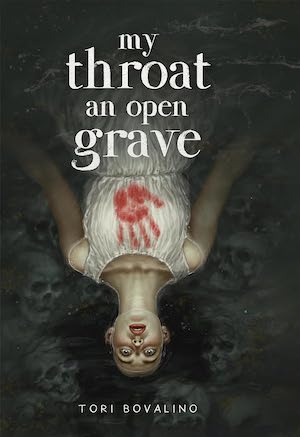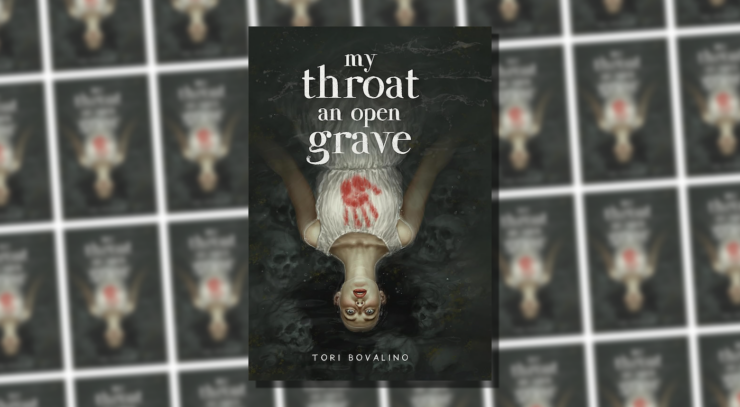Leah has been raised in Winston, a small Pennsylvania town where young girls are brought up to believe that they are always just a step away from unforgivable sin, and that any wayward girl will be taken away by the Lord of the Woods, a shadowy being who lurks at the edge of the forest, stealing away young women and babies. Leah is trying to remain on the straight and narrow, finishing off school, working at her dead end job and helping care for her baby brother. So one night the baby won’t stop crying, Leah frustrated and exhausted, wishes him away. Owen vanishes, a bundle of twigs left behind in his stead, and Leah is forced to follow the town’s dictum and go strike a bargain with the Lord of the Woods to get the baby back.
Historically, no girl has ever come back from such a journey, nor has any baby been returned, but Leah has no choice but to leave. This is how things are done in Winston, where “all the girls like [Leah] end up with their choices taken away”.
Tori Bovalino’s third novel, My Throat an Open Grave, is pitched as YA horror inspired by the 1986 fantasy movie Labyrinth. The Labyrinth reference is clear from the premise itself, of course. But that’s pretty much where it ends—once Leah enters the forest and meets the Lord of the Woods, the novel becomes more of a YA romance with a touch of folk horror. Tristan, the Lord of the Woods, is not the evil, cruel god Leah had been raised to fear. Instead, (no spoilers) Leah finds herself in the company of decent people, a kind and welcoming community, and a potential love interest. Even the ghosts she meets have more depth to them than she initially believes.
Of course, this new knowledge doesn’t just start to change Leah herself, but also all that she thinks she knew and understood about her hometown and its people. What happened to all the girls who came to the woods before her, the girls whose ghosts and memories haunt Leah in the woods, begging for retribution, justice, peace? The stories Leah has been told and the stories she hears in the woods from Tristan and his community do not add up, so Leah must face her fears in the woods to understand what the future holds for her—or if she has a future at all.
Buy the Book


My Throat an Open Grave
This is as much a bildungsroman as it is a story of rebellion against the patriarchy, against the weaponisation of religion, against limitations imposed on young women in order to control them. Winston is an oppressive place; the small town’s church attempts to control its female population by fear, policing their bodies and their actions. The tenets of the town—and more specifically, its church—lean heavily to sexist bigotry, as they remove responsibility from the young men and instead lay all blame on young women, never giving them the chance to achieve their potential. The vicious cycles continue from mother to daughter, with Leah having a fraught relationship with her mother, yet being unable to stand up for herself, caught in a sort of emotional Stockholm syndrome where she wishes she could hate her mother and didn’t so desperately want her love and acceptance.
Bovalino makes it clear that all the indoctrination Leah has been through has left her more than just a little conflicted. She is a confused, traumatised young woman filled with doubt about her every thought and action, in the most negative of ways. Leah finds it impossible to believe that she is not evil, simply because she cannot reconcile natural human desire with what she has been taught: “I am a mangled thing. I am soiled black with sin. I have broken the rules that were set out for me, trampled over the holiness of my body.” This sort of narrative does repeat a bit, and can feel a little overwrought at times as we see Leah think this way and immerse herself in water consistently to wash away her “sins,” so it is a relief to see her grow especially at the denouement of the novel.
My Throat an Open Grave is very readable. It doesn’t maintain the initial folk horror atmosphere it begins with, but it still manages to maintain a level of suspense, as it continues to build on a serious thematic background. At times it feels like it is keeping the reader at arms length, particularly when it comes to connecting with the characters. Without spoiling major plot points, Leah’s secrets make her tough to get to know well, as do Tristan’s. Most of the characters, in fact, are holding back, which may add to the suspense of the story but does not make them easy to fully align with. Regardless, the story makes pertinent points, raises a decent amount of hair, and questions who the monsters really are.
My Throat an Open Grave is published by Page Street.










